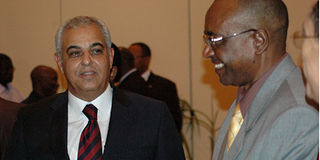Sudan walks out of Nile River talks

Ethiopian minister for Water Resources and Irrigation Dingamo Asfwa acknowledges delegates at the opening of the Nile Council of Ministers conference in Kinshasa, DR Congo. The meeting was disrupted temporarily after Sudan walked out in protest. Photo /WALTER MENYA
What you need to know:
- Ministers skip contentious issues to make some progress
The Nile Council of ministers has adopted sections of the cooperative framework agreement for the establishment of a permanent commission to manage the river
In arriving at the resolution however, the water ministers from eight member states side-stepped the contentious article 14 (b) of water security that has long been withholding the adoption and ratification of the CFA.
The article will now be resolved by the Nile River Basin Commission that will replace the Nile Basin Initiative, the ministers told the Press after a 10-hour in Kinshasa .
Nine ministers from the member states met at the Grand Hotel for two days with the conclusion of the talks on top of the agenda.
The ministers were Mr Deogratia Nduwimana (Burundi), Mr Jose Endundo Bononge (DRC), Dr Mohamed Nasr el-Din Allam (Egypt), Mr Asfaw Dingamo (Ethiopia), Mr John Nyaoro, representing minister Charity Ngilu (Kenya), Mr Stansilas Kamanzi (Rwanda), Mr Kamal Ali Mohamed (Sudan), Prof Mark Mandosya (Tanzania) and Ms Janet Byakatonda (Uganda)
“We have agreed to have a permanent Nile River Basin Commission to start its work as soon as possible,” said Ms Byakatonda, the Ugandan Minister of State in Charge of Environment.
“Many people know that Article 14 (b) was pending, but we have agreed to allow the commission to take it up,” she added.
Prof Mwandosya added: “We have had an exciting and fruitful day and we now have a convergence on critical issues.”
However, the Sudanese delegation was absent as the other members adopted the CFA after they had earlier walked out demanding that the contentious issues be referred to the member heads of states.
But Prof Mwandosya felt that “referring the matter to the heads of states would be a vote of no confidence on us (Nile-CoM).”
The adoption of parts of the CFA now removes from the shoulders of the Nile-CoM the disagreements that have characterised the negotiations.
However, the signing of the agreement has yet again been put off and hopes are now pegged on the next Nile-CoM meeting in Egypt next July.
The adoption of sections of the CFA now mean that water affairs ministers of the riparian states will take the framework back to their respective Cabinet councils and parliaments for ratification, less the contentious issues.
This, the ministers said, was to allow for speedy formation of the permanent commission through which member countries will act together to manage resources of the world’s longest river.
The agreement is steeped in water security, equitable use and conservation of the environment by the riparian states.




